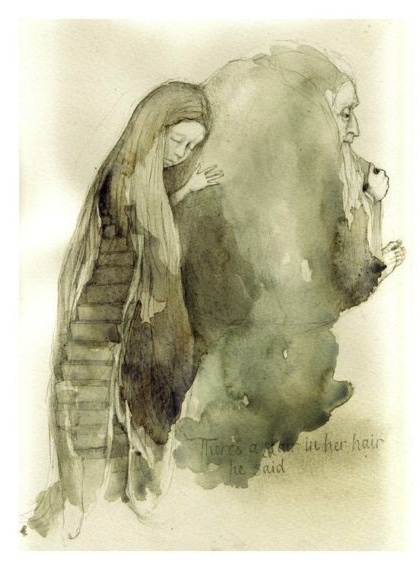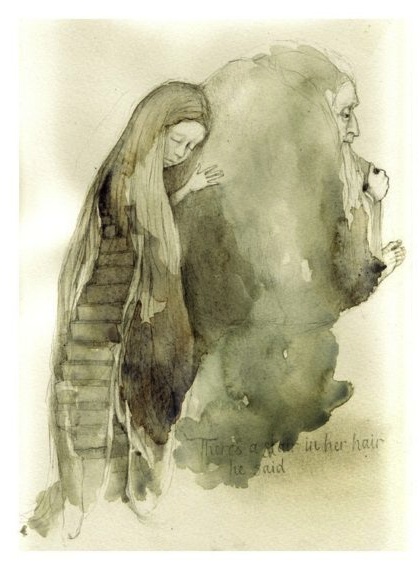In February of 2010, I was going to grad school in Cornwall, England, living in a many-bedroomed student house called The Old Library built of the bones of dismantled ships, and so very like a fairy tale when I realised it had been a couple of months since I’d checked my Other E-mail Address.
Some of you probably have at least one of these: an alternate account you use for mailing lists you feel guilty not subscribing to but have little enough interest in to warrant daily perusal. An account to be used mainly for things like Facebook notifications (before you learned how to turn those off) and petition signatures when you didn’t want to be spammed with follow-up requests. That sort of thing.
Maybe that actually isn’t normal at all.
The point is, such accounts can be dangerous. Mine certainly was for me, since when I logged in, I found I had an e-mail from Ellen Kushner telling me about a new anthology of Terri Windling’s classic Bordertown series, Welcome to Bordertown, a series I’d come across as a teen and completely adored, and which had introduced me to a number of writers who became my mythic fiction heroes.
Ellen Kushner one of those very heroes was inviting me to contribute a poem to this anthology.
The message was three weeks old.
I shrieked! I wrote back! I explained that I never used this account (which of course was the one prominently displayed on my Facebook account which I similarly never used ah, those heady days), and please please please could I still be involved even though the deadline was in two days technically I would get something written honest I would!
Ellen wrote back very kindly to say that I could have a couple more weeks.
Instantly, knowing Catherynne Valente was writing something for this anthology too she had squee’d to me about being invited, oh, THREE WEEKS PRIOR I wrote to her. The subject line of the e-mail was, as gmail informs me, “OMFG!!! AUGH! CAT! CATTTT!!!!!!” and detailed with eloquent panache that since we were encouraged to write poems that riffed on the stories in some way, I would love to write something inspired by or in league with hers.
Cat’s reply was “Girl! I’m doing a story about a singer! Write me lyrics!!” and after mutual outpourings of gush and joy and overall extremely shmoopy happiness, we got to it.
Now, not far from where I live is an artist named Rima Staines, whose work I first encountered via Terri Windling (the original Bordertown series creator), and whom I had had the pleasure of meeting and getting to know a few months before. I had recently made a gift of a print of Rima Staines’ There’s a Stair in Her Hair to a friend, and the title and image haunted me.

There is a girl with a stair in her hair stuck to my thoughts like a burr, and I remember very clearly walking home at night turning that line over in my mind, finding it a melody. The first stanza of the song came together that night:
There is a girl with a stair in her hair
made of thorn and thistle and bone
There is a girl with a stair in her hair
and she climbs it to be alone.
But it was a tentative thing, and I wasn’t at all sure this was going to be the Bordertown piece, since I still wanted to run it by Cat and make sure it had some relevance to what she was doing.
“Crazy!” she said. “My girl, whose name is Fig, definitely has a hair metaphor thing going on!”
It turns out that Fig, the protagonist and narrator of “Voice Like a Hole,” measures the distance between herself and the home she left by the length of her undyed roots; the longer they get, the more they stagger into a kind of staircase in her hair.
Confident that we were both moving in the same direction at the same pace, we wrote apart; I added a few more stanzas and hammered out the general shape of the song, while Cat wrote a first draft of her story. We shared these with each other as we went along, and gave each other suggestions: I sent her a wobbly recording of myself singing the melody in my head, and she recommended slight variations; we hammered out stronger end-rhymes and story structure together; the more I learned about Fig, the more I tweaked my stanzas to reflect the fact that they were being sung by her. In the anthology, “Voice Like a Hole” ends with the promise of a song and is immediately followed by “Stairs in Her Hair,” and this is exactly as I hoped it would be.
Since then the song has found its final shape in melody as well as in print: my sister Dounya and her fiancé, the musician Gabriel Bouchard have recorded it together, with her singing my melody to his accompaniment and arrangement:
This song will also be appearing in the Welcome to Bordertown audiobook, which makes me want to jump up and down.
Looking over this post, I find myself marveling at how collaboration has wrought collaboration—how working with Ellen led to writing with Cat which led to engaging with Rima’s work which led to singing with my sister and her fiancé. It’s like a beautiful round robin of works, all tugged and tied together by Bordertown. It was magic enough to be invited to visit; it’s magic all over again, and means the world to me, that my family could follow me there, and meet so many of my dear ones along the way.
Amal El-Mohtar, a Canadian-born child of the Mediterranean, received the 2009 Rhysling award for her poem “Song for an Ancient City,” and has received a Nebula nomination for “The Green Book,” a short story originally published in the Arab/Muslim issue of Apex magazine. Her work has appeared in many online and print publications; full bibliography is available on her official site. She also co-edits Goblin Fruit, an online quarterly dedicated to fantastical poetry, and keeps a Livejournal somewhat tidy here.










